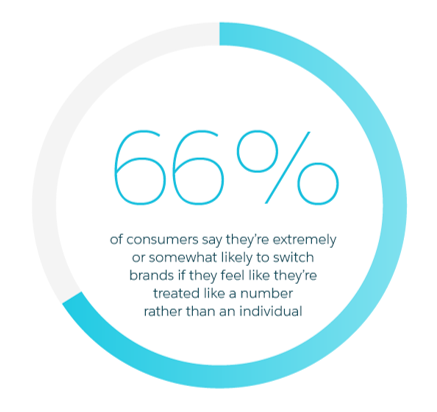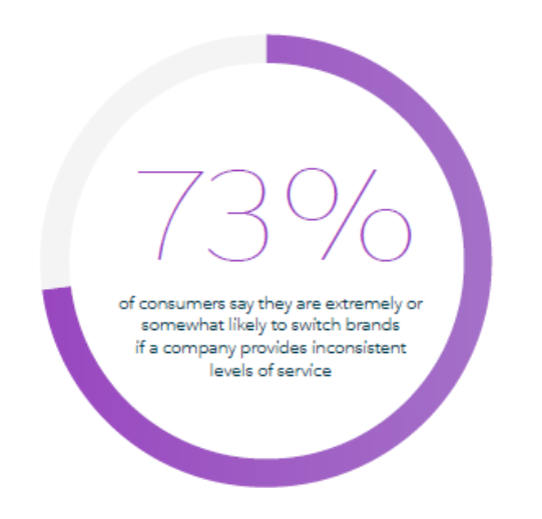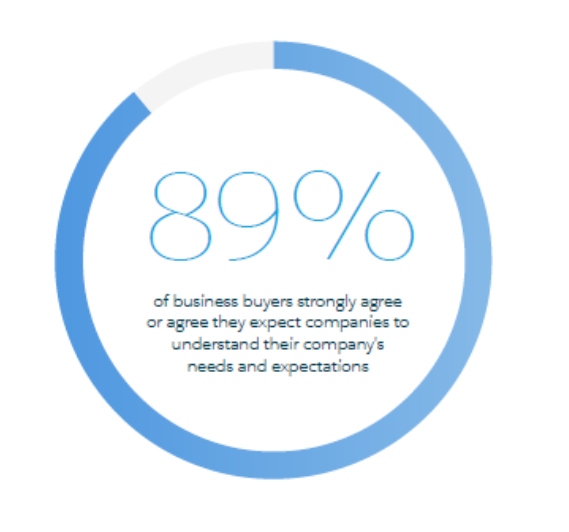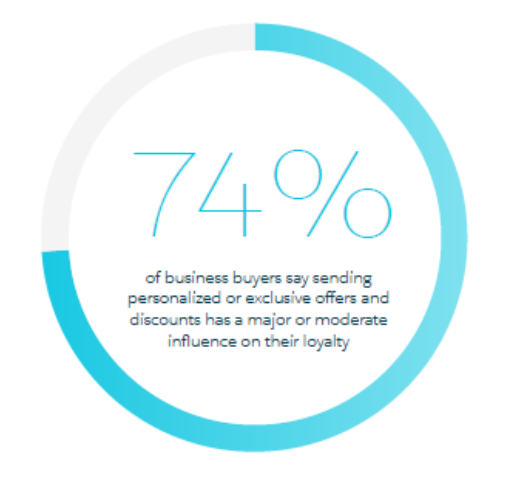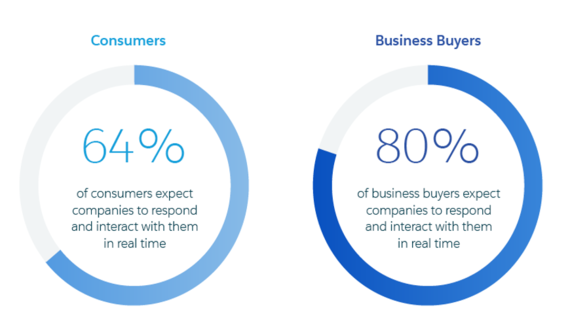New technologies like artifical intelligence is changing customer' expectations and behaviors. By 2020, more than six billion smartphones and 50 billion connected things will completely transform the customer experience - welcome to the age of the connected customers. Only companies with advanced sales and marketing capabilities will be able tus successfullly compete in the hyper connected, knowledge sharing digital economy.
In the age of the connected customer, research points to three ways businesses risk falling short of delivering in this new world of the connected customer. Salesforce Research surveyed more than 7,000 global consumers and business buyers to discover how the connected world has created a smarter customer -- and the myriad ways that technology is elevating what they expect from companies.
The result is the new "State of the Connected Customer" report, in which 61% of consumers say technology is redefining their behaviors. In this age of the customer, the report finds that technology is fundamentally changing the way customers expect to interact with companies, with profound implications for sales, service and marketing.
- Customers expect every touchpoint with companies to be immediate, personalized, and proactive. Sixty-four percent of consumers expect companies to respond and interact with them in real time.
- Customers expect consistency and contextualization in their interactions with lines of business across various channels.
- 81% of consumers expect the same level of service every time they interact with a company across different channels, from purchasing to speaking with customer service.
- 75% of consumers expect companies to provide consistent experiences wherever they engage, whether on a website, social media, mobile or in person.
Companies that treat customers with awareness and intelligence -- and put the customer experience at the center of their business strategies -- will succeed in this connected world.
The Three Biggest Gaps in Meeting Connected Customer Expectations
Smart companies understand that the overall customer experience determines the future success of their businesses. These companies win loyalty by treating customers like individuals, anticipating their needs and catering to their increasingly mobile lifestyles. Yet some businesses have been slow to adopt new technologies that can help deliver faster, more personalized customer experiences. Salesforce's "State of the Connected Customer" report found the biggest gaps that still exist between customer expectation and business delivery are in personalized service, mobile experience and predictive intelligence.
1. Delivering a Personalized Experience
Connected customers expect consistent and intelligent experiences across every interaction or communication channel. In turn, customers expect that businesses will leverage their data to create and deliver intelligent, unique customer journeys that cater to their needs.
Fifty-seven percent of consumers agree they're willing to share data with companies that send personalized offers and discounts, and 52% of consumers say they're likely to switch brands if a company doesn't make an effort to personalize communications to them -- a true turning point in customer attitudes towards their data. Among millennial consumers, even more are willing to share their data for offers (63%), as they have been normalized toward sharing personal data on social networks and elsewhere.
However, the majority of marketing teams aren't taking full advantage of customers' willingness to exchange data for personalization, according to Salesforce Research's "2016 State of Marketing" report conducted earlier this year. While 56% of marketers use subscriber fields to personalize emails, few are using more advanced technologies. Only one quarter of marketers trigger personalized real-time emails based on events (e.g., receipts or password resets) and just 26% leverage predictive intelligence/data science to personalize emails. While 74% of marketers agree that web personalization is effective at helping their company create a cohesive customer journey, only 29% are using it extensively as part of their marketing strategy.
2. Anticipating Needs with Predictive Intelligence
The traditional sales pitch is no longer enough -- customers are looking to engage with businesses that understand their unique needs and can advise them on the right product or service, at the right time. Seventy-six percent of consumers say it's absolutely critical or very important to work with a salesperson who focuses on achieving their needs instead of making a quick sale. Furthermore, more than half (51%) of customers expect companies to anticipate their needs and make relevant, proactive suggestions across every touchpoint.
Companies should focus on developing relationships and delivering a purchasing experience that feels both personal and seamless. Predictive intelligence can help inform marketing communications for tailored, dynamic customer journeys -- including personalized and curated emails, social media interactions, landing pages and product suggestions.
But Salesforce Research's upcoming second-annual "State of Service" report found that only 54% of service teams have predictive intelligence capabilities in place. In addition, only 30% of sales teams surveyed by Salesforce Research in its upcoming "State of Sales" report currently use predictive intelligence. Finally, just fifty-three percent of marketing teams surveyed in the "2016 State of Marketing" report currently use predictive intelligence to understand customer preferences and behaviors.
3. Embracing the Culture of Immediacy
Technology isn't only changing how customers consume information and buy products -- it's also changing their expectations of timely interactions, and mobile is at the epicenter of instant gratification. Connected consumers feel there shouldn't be any lag time when it comes to company communications, and 80% say a company responding immediately when they reach out for help influences their loyalty.
Today's customers value using their mobile devices to conduct key shopping activities, such as price and product comparisons and online reviews. More than half (52%) of consumers say they wish they could do more with their mobile devices.
The trend is set to pick up steam as more millennials enter the workforce and their collective purchasing power increases; compared to baby boomers/traditionalists, millennial consumers are 2.9x more likely to prefer purchasing products via a mobile app than an e-commerce site and 2.3x more likely to forgo purchasing from a company if it didn't offer a mobile app.
In spite of customer preferences for using mobile devices to perform key buying activities, only 8% of B2B sales organizations, 13% of B2C sales teams, and 14% of B2B2C companies rate their ability to provide mobile sales as outstanding as noted in Salesforce Research's upcoming "State of Sales" report.
Successful companies will prioritize real-time, always-on communication by embracing a mobile-first mindset and using technology to respond as soon as -- or even before -- a customer reaches out.
We're only seeing the beginning of the impact of the connected customer. Customers expect companies to continue to develop innovative experiences that meet their evolving needs. Fifty-seven percent of consumers go as far to say that being innovative is an absolutely critical or very important attribute of the companies from which they purchase. By 2020, consumers foresee technology innovations as increasingly integrated with the customer journey.
For example, 63% of consumers expect companies to provide products and services connected to the internet (i.e., internet of things) by 2020. Customers want brands to understand them -- and to demonstrate that understanding by providing intelligent, informed, and personalized communications.
Customer experience is the new battlefield for competitive differentiation. Personalization, intelligence and speed are the new currencies in the age of connected customers. At the heart of digital business transformation is the competitive need to improve the customer experience. Each connection matters. Each touch-point in the customer journey, before, during and after a purchase of products and services, matters. The better the connection, the better the experience. And the better the experience, the more likely that you will earn the business of the connected customer. For more on the connected customer, see the full "State of the Connected Customer" report here.



